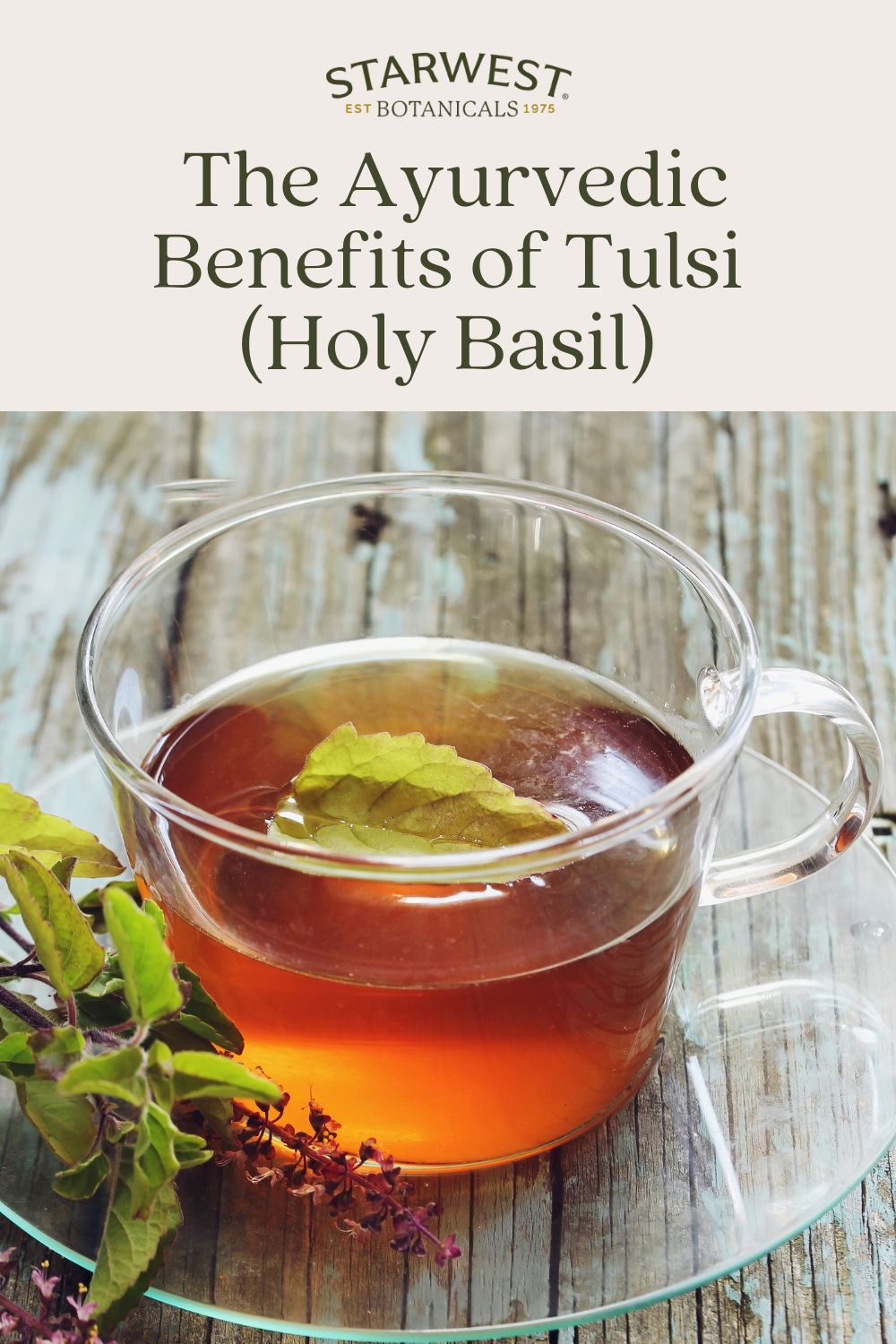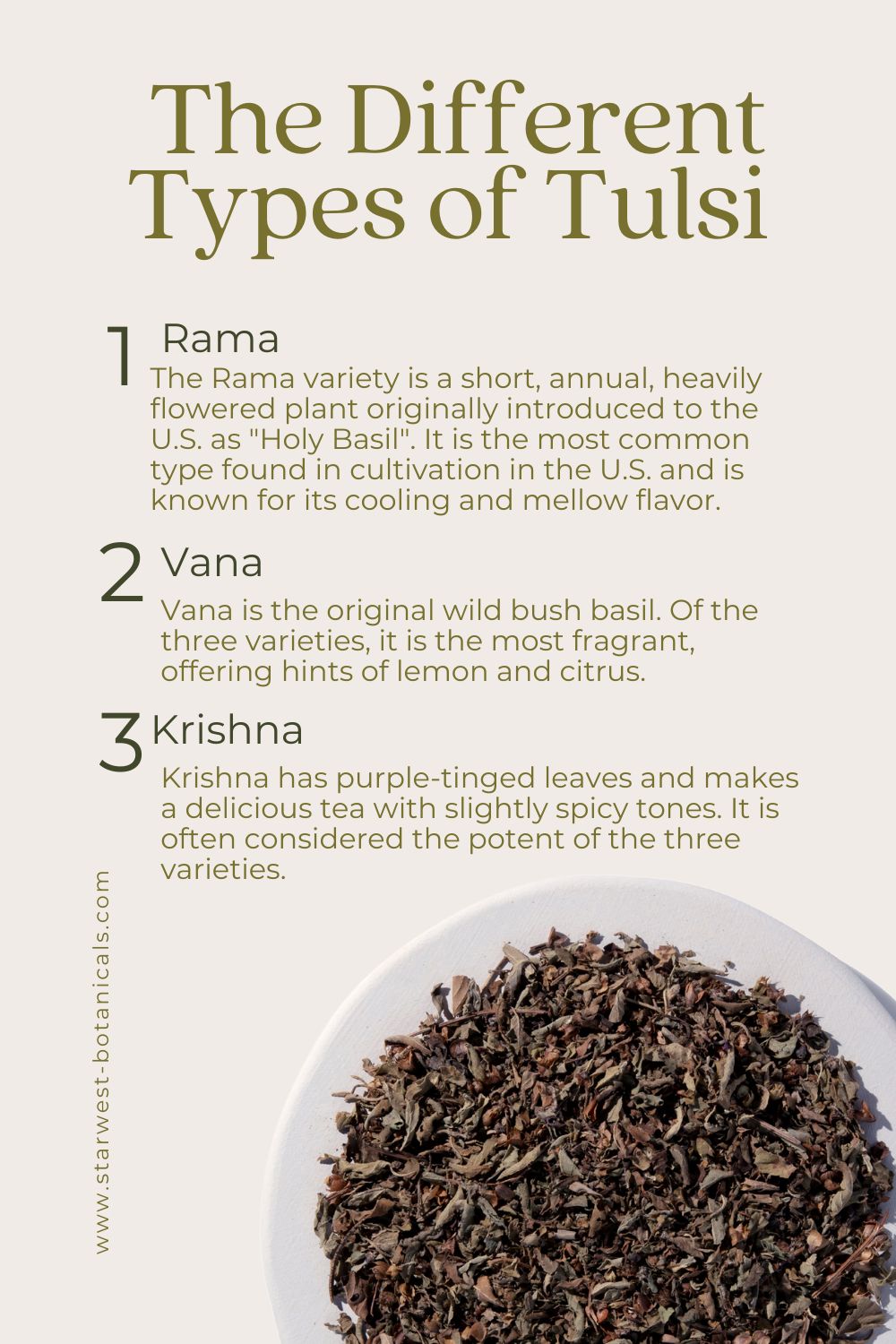The Potential Benefits of Tulsi (aka Holy Basil): Ayurveda’s Best Kept Secret | Starwest Botanicals
Posted by Molly McConnell on 01-08-2024

A Truly Divine Herb
Tulsi, aka holy basil, has long been revered in ancient Ayurveda and is often thought of as the goddess in plant form. It is considered to be a spiritually sacred plant that may promote a sense of calm and divinity wherever it grows. While the leaves are most commonly used in herbal remedies, the seeds, bark, root, and oil also have holistic properties. When taken internally, tulsi is believed to open the heart and the mind, while promoting a sense of love, devotion, compassion and clarity. Often classified as one of the most sacred plants in India, it is said that tulsi purifies the aura and offers divine protection.
The Ayurvedic Perspective on Tulsi
Ayurvedically speaking, tulsi is considered to be pungent, bitter and heating (except the seeds, which are cooling). It is also categorized as subtle, light and dry. Holy Basil is generally supportive of all three doshas, but may increase pitta (the fire element within) when used in excess.
In the ancient Ayurvedic texts, tulsi is said to liquify excess kapha (the earth and water elements within us) that may be responsible for congestion or breathing challenges. It is also famously classified as a sattvic herb for its potential to support a meditation practice by heightening awareness and opening the heart.
Potential Benefits of Tulsi for Body and Mind
In addition to these more spiritual associations with the plant, tulsi has many other even potential benefits associated with the physical body and mind. The ancient wisdom of Ayurveda classifies tulsi as a substance that may have the potential to elevate perception, aid circulation, decrease congestion, clear mucus, and relieve skin reactions.
Tulsi has a particular affinity for the heart, lungs, and adrenals, which explains why Ayurvedic practitioners often recommend it for cultivating compassion, expediting recovery from seasonal wellness challenges, and promoting a balanced stress response. In fact, this ancient herb is celebrated as a modern adaptogen in holistic wellness spaces. Adaptogen is a term that arises from Western Herbalism to describe something that helps the body adapt, or modulate, in times of stress.
Modern studies have also found tulsi to support healthy inflammation levels and immunity — all of which make it an essential herb not only for the fall and winter seasons, but for overall wellness year round.
Tulsi Tea for The Doshas
One of the most common ways to incorporate tulsi in a tridoshic daily routine is to have it in the form of tea. Tulsi does especially well when paired with other herbs like ginger, gotu kola, cinnamon, cardamom, lemongrass or rose — not to mention it tastes amazing. For kapha and vata constitutions, try tulsi tea with ginger or cinnamon. For pitta conditions, pair tulsi with the more cooling herbs, such as cardamom, lemongrass or rose. Those looking to support mental clarity may benefit from a combination of tulsi and bacop (aka brahmi). These herbs are all caffeine-free, including tulsi, and make for a great afternoon pick-me-up — especially when you’re to cut back on substances like coffee.
To learn more about how to incorporate tulsi into your life, check out 5 Trusted Tulsi Remedies for Overall Wellness.

The Different Type of Tulsi
When you order tulsi online from a trusted source, you may notice that there is often more than one variety to choose from. Starwest offers three types of tulsi, or holy basil: Rama, Vana, and Krisha. All varieties are cousins of sweet basil and belong to the mint family.
The Rama and Krishna varieties share the interchangeable botanical names Ocimum tenuiflorum and Ocimum sanctum; the two Latin names are synonymous with each other. They are, however, more like fraternal twins.
The Rama variety is a short, annual, heavily flowered plant originally introduced to the U.S. as "Holy Basil". It is the most common type found in cultivation in the U.S. and is known for its cooling and mellow flavor. While more mild than the other two varieties, it does have medicinal value and is considered to be the best tasting. Here at Starwest, you will find Rama available in a cut/sifted form for tea, as well as a powder and an extract.
Krishna has purple-tinged leaves and makes a delicious tea with slightly spicy tones. Believed to contain the highest concentrations of adaptogenic triterpenoic acids (which affect the body's response to stress), it is often considered the potent of the three varieties.
Vana has its own Latin name: Ocimum gratissimum. It is the original wild bush basil. Its natural habitat ranges throughout India and across North Africa and down into East Africa. Of the three varieties, it is the most fragrant, offering hints of lemon and citrus.
When blended together, the three make a perfect trinity, optimizing for potency, flavor and fragrance. If you want to start simple, opt for a set of tulsi tea bags that features all three varieties in one. This will give you a sense of the overall flavor and potency that tulsi represents. From there, you may be curious to explore each variety on your own and determine if you have a favorite within this sacred trinity.
Tulsi is traditionally a well-loved herb, and we think you’re going to love it too.

Bio
Molly McConnell is a Certified Ayurvedic Practitioner who is committed to cultivating collective wellness. Guided by curiosity, embodied listening, and the rhythms of nature, Molly’s approach to Ayurveda is intentional and intersectional. As the cofounder ofCultivate Balance, she supports purpose-oriented people to come home to their bodies and restore resilience through nourishment, ritual, and routine. For a more immersive experience,Connect with Molly 1:1 or check outThe Reset for Resilience.
Instagram/Tiktok
Website



